

TABLE OF CONTENTS
CURRICULUM VITAE 4
ACADEMIC WORKS
Part 1: Homogenous Machines 8
Part 2: Slide 20
Part 3: Pluginverse 30 Thesis: Free To Play 40
Trojan House 60 Vertical Warehouses 80 Misreading Geometry 92

PROFESSIONAL WORKS
Astan Ghods Museum Design Competition 102 Shahgholi Villa 116 Elahie Residential Apartment 126
PERSONAL WORKS 142
Full resolution portfolio available on: issuu.com/nimashoaie

Nima Shoaie

Born on July 3, 1997 - Iran, Tehran Currently based in Winnipeg, Manitoba, Canada
Language Knowledge: Interests:
Persian Full Professional Proficiency [Mother Tongue] English Full Professional Proficiency
Criticality, Fun (in general), Animation, Comedy, Video Games, Cooking, Livestreaming, Sci-fi culture, 1980s synthwave, Art, Art History, Architecture, History, Philosophy, Religions, Sculpting, Drawing, Space, Color Red, Shitposting
Education
Master of Architecture University of Manitoba 2022/09 - Ongoing
Bachleor of Architectural Engineering Islamic Azad University Central Tehran Branch 2014 / 10 - 2020 / 09
Contemporary Architects’ Association (CAA) School of Architecture: Main Studio: Plug-in Systems Studio [Hooman Talebi] 2017 / 11 - 2018 / 07
Instructors: Homa Farjadi, Hooman Talebi, Farshad Mehdizadeh Alireza Taghaboni, Kamran Heirati
History of Technology in Architecture
Theoretical Course, Contemporary Architects’ Association 2019 / 12 - 2020 / 03
Instructor: Iman Ansari
Sculpture, Classical Drawing, Plastic Anatomy
Studio of Raffi Davtian 2014 / 07 - 2018 / 10
Professional Experience
JUNIOR ARCHITECT :
MARZ Design Studio
2018 / 07 - 2018 / 11
Imam Reza Museum Invited Competition Design Team
Farshad Mehdizadeh Design | FMZD 2019 / 01 - 2020 / 10
Shahgholi Villa Project Architect
Elahie Residential Apartment Project Archietct
Sahi Residential Villas Design Team
Kuwait Business Incubator Center Design Team
IUVA Hotel and Resort Masterplan Design Team
Kish VIP Resort Design Team
Kelarabad Food Plaza Documentation/Visualization
Velenjak Residential Apartments Documentation/Visualization
Namakabrood Commercial Center Documentation/Visualization
Sangan Hotel Documentation/Visualization
WAF 2019 Finalist Presentation Documentation
EDUCATIONAL ROLES :
University of Manitoba
Teaching Assistant (TA)
EVAR 3014: Drawing 2022 / 09 - 2022 / 12 Instructor: Brian T. Rex
Teaching Assistant (TA)
EVDS 2300: 2023 / 01 - Ongoing
Structures, Materials and Assemblies Instructor: Mark Meagher
Grader
EVAR 3006 Arch Tech 2 2023 / 01 - Ongoing Instructor: Liane Veness
Awards
FREELANCE WORKS :
MARZ Design Studio
2018 / 12
Arian Saeed Pavilion Fabrication Supervision WOODEX 2019 exhibition
Iran Unbuilt Architectural Projects Expo 2019 / 10
Introductionary Video: Video Editing "Tehran, if they were built ..." [In collaboration with Farbod Yamani]
KAZ Studio
2021 / 06 - 2022 / 01
"Shahgholi Villa" Virutal Reality (VR) Demo Developer "Riyadh 1001 Gates" animation project Storyboard artist / Video Editing "Vertical Gardens" animation project Storyboard artist / Video Editing "Shushah Island Phase 01" animation project Storyboard artist / Video Editing "Shushah Island Phase 02" animation project Storyboard artist / Video Editing "Rub Al Khali Desert Resort" animation project Storyboard artist / Video Editing
archiKID
2021 / 01
Booklet Design Graphic Design / Print Supervision for York University's report on archiKID titled: / Documentation "Future Architects of Sustainability: a Glance into archiKID's profile"
World Architecture Festival (WAF) 11 / 2021 (As part of FMZD | Farshad Mehdizadeh Design)
Winner, Shahgholi Villa, in House - Future Projects category Project Architect Shortlisted, IUVA Hotel and Resort Masterplan, in Leisure Led Developement - Future Projects Design Team
1st place in Upcycling Retail international Competition 09 / 2019 hosted on uni.xyz , [Jury: Nader Tehrani, Ángel Verdasco] Vertical Warehouses [Collab with Yasaman Arjomand]
Project Architect
3rd place in Imam Reza Museum Design Competition 11 / 2018 (As part of MARZ Design) Limited/Invited Competition Design Team
Softwere Skills
Adobe After Effects
Adobe Premiere
Adobe Indesign
Adobe Photoshop
Adobe Illustrator
Revit Blender

Part 1: Homogenous Machines
CAAI School Of Architecture: Plug-in Systems Studio

Students:
Nima Shoaie, Mahyar Rakei Tutor: Hooman Talebi TAs: Davood Mohammadhassan, Hassan Karimi, Farshad NasririDate: December, 2018
This exercise is a 3 month attempt to find and discover potentials in altering a system by “pluging in” a new system to it, without erasing or destroying the original system. The original system was chosen as a grid, in which by “playing” with its members, new possibilities and potentials were discovered.
This endeavor started by “playing” with the typical cartesian grid structurem which lead to the question of how to activate a system without adding an “alien” system ? (meaning that the second system’s structure was made from the same genus as the original system, a “Homogenous” one). By altering the grid (The first system), new members were made that by the act of “sliding”, generatated new cells. Therefore a new challenge rose from these findings: How to generate new potentials by pluging-in systems, in which this added system used the same “language”. This second system, when plugged-in with the original system, offered new possibilities and potentials, such as transformation in the cells in both systems, creation of new cells and joining of these cells to create bigger units, able to expand in the original grid.
During this plug-in, the second system can “Slide” and enter the second system and integrate with it, while at the same time enabling the possibility of change within the original system. Also, the plugged-in system can return the original system to its first stance and leave the integration proccess. This plug-in resulted in the division of cells within both systems (grids) and creation of uniform cells. Another developement of this problem resulted in adding surfaces to the second systems’ cells, thus creating more diverse cells during the plug-in. This plug-in and the resulting sliding of the two systems on each other also affects the ground beneath and leaves traces of this integration.

First physcial “Discoveries”, resulting from playing with an available module













Application of the Second System unto the First system, both of a same “language”
Components of the First System




Plug-in of the two systems, while affecting the ground beneath, also merges the Pattern of the two systems from top view


Drawings, produced to discover the Plug-ins other potentials

 Plug-ined Systems, of the same “breed”, and the subsequent changes
Plug-ined Systems, of the same “breed”, and the subsequent changes
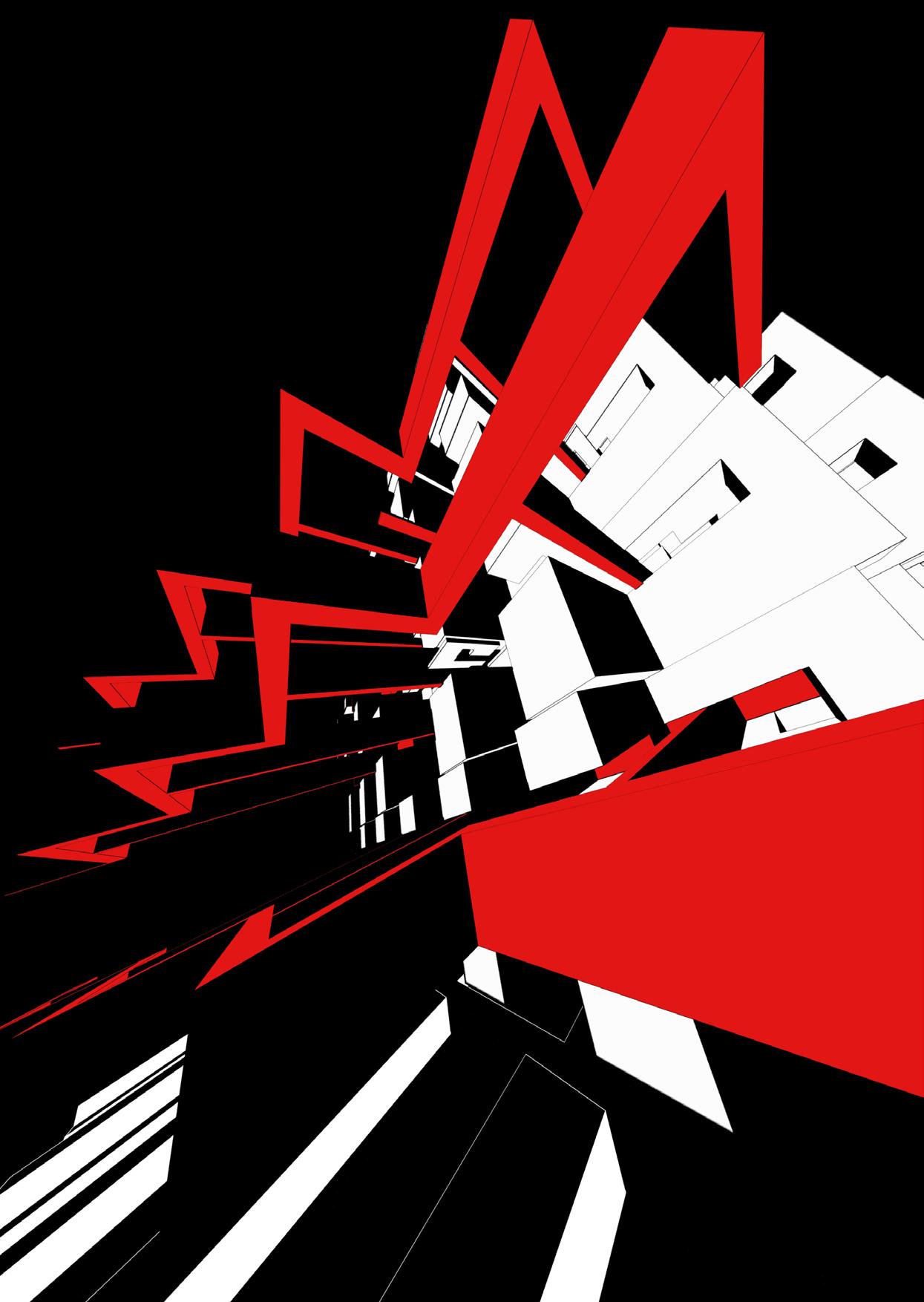



CAAI School Of Architecture: Plug-in Systems Studio

Students:
Nima Shoaie, Mahyar Rakei, Yasaman SetayeshTutor: Hooman Talebi
Date: February, 2018
Lalezar Street is a historical street located in Iran, Tehran. It has been the location of adoption of new cultural fascination of near contemporary Iranian society for the last 200 years, typically from western sources. Yet due to numerous political and economical reasons, where once was a place of cabarets, cafes, bars and political headquarters has now been repurposed to act as bazzars, marketplaces and numerous commercial and industrial centers.
By analysing Lalezar Street from past times until present, It can be assumed that it has undergone numerous changes in its’ physical features (body) and Programs. In some of these changes, the new program is not “loyal” to the original body, which results in the creation of a new body. Meanwhile in other situations, the new program is formed and flourishes within the original body.
This project’s understanding of Lalezar street lies in studying these “Plug-Ins” of programs, made of the same breed (mostly Economic), that constitutes a dialogue with their original programs and bodies. Each of these Plug-Ins, according to the properties of the program and body, affect the original body differently and in return accept some changes themselves. The role of Grid, which acts as as a flexible body in forming and organizing these Plug-Ins and allowing the “Sliding” between the Plug-ined program and the original program, either temporary or permanent, directly affects the qualities of the Plug-Ins.

3 different cases of programatic “Plug-ins” present in the Laleh Zar Street was studied

Grand Hotel - Constant Plug-in
An abandoned hotel in in the heart of Lalezar Street, nowdays turned to a commercial building: a “Constant Plug-in”


”Results of a “constant” Plug-in: division of the hotel “Cells” by adding a new floor for storage

Results of a “constant” Plug-in: Circulations changes and creation of temporary storages in hallways

Lalehzar Bazaar - Semi Temporary Plug-in


A cafe turned into a commercial building with Bazzar like propeties, still retaining traces of its originial spatial organization.


Parvaneh Parking Lot - Temporary Plug-in
A parking lot with twin programs: Parking lot in weekdays but transforms into a bazzar on the weekend.




 Temporary programs of Parvaneh parking lot: a parking lot in workdays, a bazzar in the weekends
Parvaneh Parking Lot, under the temoporary market program
Temporary programs of Parvaneh parking lot: a parking lot in workdays, a bazzar in the weekends
Parvaneh Parking Lot, under the temoporary market program
Organization of the Program with the origianl body, and lack of a distinct border between the secondary cells (Parvaneh Parking Lot)

Cell fragmentation and occupation of each cells surface, before and after the temporary plug-in

The plug-in, affecting nearby buildings and markets, flooding the surroundings with customers (Parvaneh Parking Lot)

Part 3: Pluginverse
CAAI School Of Architecture: Plug-in Systems Studio
Students:
Nima Shoaie, Mahyar Rakei, Yasaman Setayesh Tutor: Hooman TalebiTAs: Davood Mohammadhassan, Hassan Karimi, Farshad Nasriri
Date: April, 2018
Discoveries unearthed in the last project [Part 2: Slide] regarding Lalehzar Street led to a realization that this “Temporary [Programatic] Plugin” not only affects the building’s body, but also affects the adjacent context, bringing in more population flow and custormers. To use this discovery in the context of Lalehzar, a rather abandoned commercial building was selected and the plugin was applied to it.
The proposed plugin acts in such a way that the mass of the existing building is inverted with the void at the center, thus removing the facade and becoming a continuation of the city in vertical levels (with the application of ramps). This creates event spaces distributed in multiple levels allowing other programs to “slide” into the building, while the original active shops of the existing building are relocated to the center. Both of these systems have their own autonomy, meaning that they are capable to operate on their own beside the existance of the other one, while at the same time having the capacity to be influenced by each other [Referencing Part 1: Homogenous Machines]


Khansari Passage is located beside a busy intersection, but is mostly devoid of any activity


Only the first and second levels of the buidling are active; the rest of the “cells” are used as storage spaces

Top Figure: Existing shape of the Khansari Passage
Bottom Figure: Proposed design, The Pluginverse
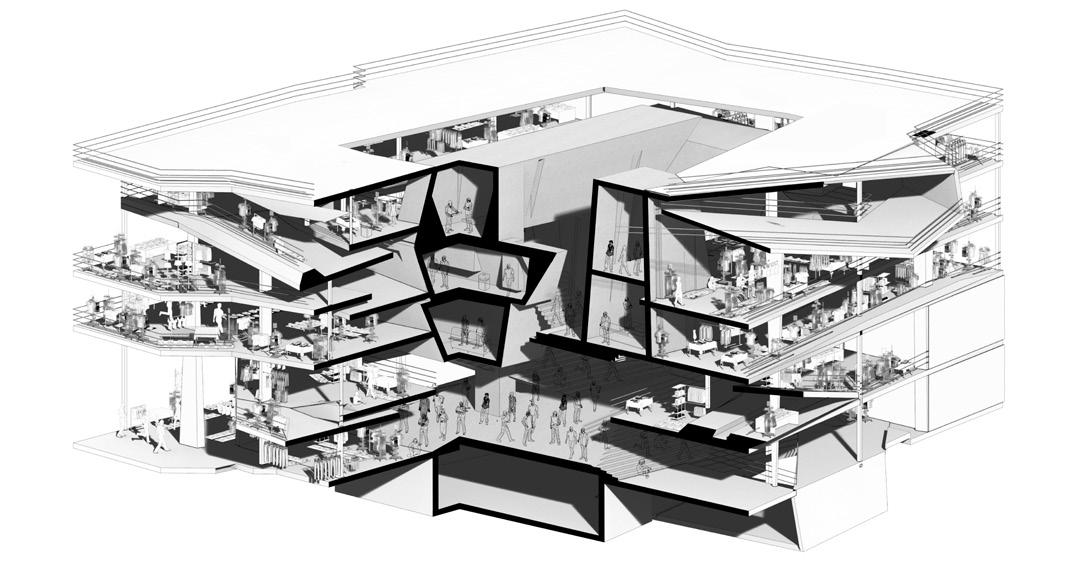

Bottom Figure: The existing relationship between mass and void in Khansari Passage
Top Figure: Pluginverse, “Inversing” the mass and void with each other Design Strategy

System 2: The Inverted Void
Becoming an open platform to host a marketplace and event spaces, and numerous other programs
System 1: The Inverted Mass
Previous shops within the passage occupy the central void in a dense matter, transforming the outer slabs to open platforms


Inversion of mass to void and vice versa, under the programatic plugin, thus forming The Inverted Void
The two systems (The Inverted Mass and The Inverted Void) retain their autonomy, having their own circulation and space, while at the same time integrated with each other


Organization of the Program within The Inverted Mass, and lack of a distinct border between the Inverted Void [Referencing Part 2: Slide - Parvaneh Parking Lot]

The Inverted Mass lacks a distinct border between its cells
The Inverted Void features oblique surfaces acting as ramps within the circulations, and in doing so becoming a continuation of city on height levels


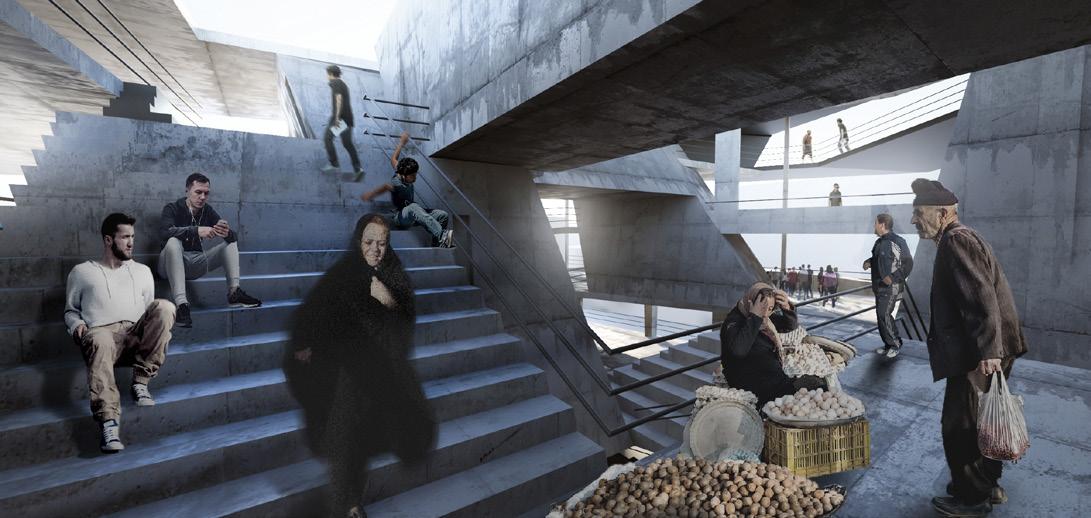


Free To Play
Thesis Project
Bachelor of Architecturual Engineering: Azad University of Tehran, Central Tehran Branch Under Prof. Hossein Sultanzadeh
Project Designer: Nima Shoaie
Rendering: Alireza Kazemirad
Physical Model [3D Printing]: Kamyar Emam

Date: June 2020
Adverstisement is a growing industry. As time goes on, more can be seen of the growing effects of ads in everyday life: Music can now be played without the purchasing the record, Videos can now be watched without payment, Video games can be played without a single purchase (Free-to-play), etc. This project proposes that advertisement, same as they act in the digital world, can affect physical programs still using the traditional Pay-To-Use system so that they can convert to Free-To-Play method, effectively offering the services free to the public. When used in a context that is dependant on human traffic (like a commercial center), this strategy can be useful to act as an attraction point and bring customers.
On an architectural note, Adverstisement usually appears as a 2D surface mounted on usually vertical surfaces that can emit certain data to the viewer. This project proposes that these surfaces can also act as architectural organization elements at the same time.
The resulting project is a Commercial-Residential complex that features an entertainment facility (a video game arena) free to the public, funded through revenue generated through various advertisement displays placed both outside and inside the mass, that contribute to the archiectural organization of the project.

1.









SPOTIFY
Free music, funded through advertisement
Ordinary USERS
YouTube
Free video/media, funded through advertisement
"Free
To
Mobile Gaming
USERS
SPOTIFY
Free music, funded through advertisement
The "Free To Play" Business model practised mostly in the digital world allows one to freely use a service without payment. Can the same method be applied to other services provided to the people, other than what is in the digital world ?
YouTube
Free video/media, funded through advertisement
Ordinary Business Model
PAYMENT
"Free To Play" Business Model
Mobile Gaming
Free Video Games, funded through advertisement
WATCHING ADVERTISEMENT
2. LAN Parties / "GameNets"




In Iran, places exist that act as LAN party centers called "GameNets": a gathering of people wishing to play video games with their friends sitting beside them, rather than playing online. Users will pay a hourly fee to rent a PC or a spot for themselves and their friends to hang out and play with each other. But can the payment part be omitted, so that the whole process is funded by revenue generated through watching advertisement ? Existing GameNets model



Design Strategy

1. Program: A gaming Hub ( "GameNet" ) located alongside one of the most crowded streets of Tehran, within a commercial complex. The GameNet is funded through revenue generated through advertisement, thus making the facility can be directed to the commercial center itself, becoming possible customers.
ADVERTISEMENT
Alwasys a 2D surface
ADVERTISEMENT
As a 3D plane: a space organizing element


2. Form: project studies the possibility that advetisements may exist in a 3D space, manifesting as an oblique surface: It allows the surface to be more than just a picture frame, and to act as an architectural organization element like Dividers, Ramps, etc. Since the angle of the surfaces is different than the traditional vertical pose, the data on the surfaces may be percieved differently from each viewpoint

 Concept Drawing: a GameNet for, free tor fall ?
Concept Drawing: a GameNet for, free tor fall ?
Valiasr Street
Valiasr Street
Project Location
Shariati Street


Project Location
Valisar Street is located in Tehran, Iran. It is one of the longest streets of the city connecting the south of the city to the north of the city. It is a frequent walking and cycling path for many civilians. Therefore, many important cultrual, commercial and entertainment facilities exist alongside this street. Because of the influx of people in this street, this location was proposed for the site of the project.
The location is located in the Valiasr Street, near its intersection of Miradam Boulevard. one side of the site is adjacent to the mostly residential/Office zones, while the other side faces the street itself and numerous institutions present.









Mass Studies
Studies conducted during the Misreading Geometry workshop attended under Pouyan Rouhi (Page 72) on numerous traditional persian carpets and rugs yielded interesting results regarding patterns and shapes woven into them. A matrix of those patterns possesing more potential was formed and numerous masses was constructed from the base patterns using basic techniques such as extrution, scaling, rotation, spliting, etc. For this thesis project, one pattern was selected from the presented matrix below that was deemed more applicable in regards to the aforementioned design strategy.


Some of the mass studies: Experimenting with rotating contours of the base pattern extrutions and slicing up the masses to aquire unique spatial qualities


Alwasys a 2D surface ADVERTISEMENT



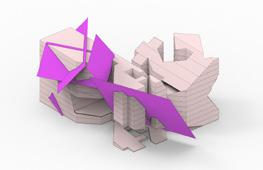




Design Alternative: Typical billboards on buildings

Profit is directed to the owner or agency involved, not used in public affairs





Billboards of different dimensions and shapes to be seen and experienced from various angles: The profit will be used to actively run a public activity (a videogame/streaming hub) free to public


LAN party / Gaming Spaces Parkings

B
B
B
Inner space is achieved by placing displays of various sizes which act as dividers, organizing the space. Stores are formed from the division.


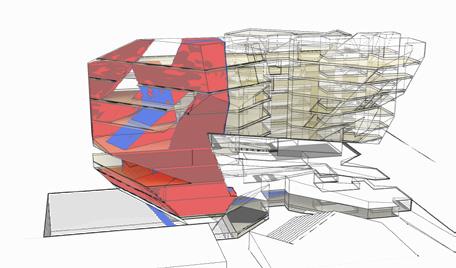
Opening facing the southern sun Allowing best sunlight to enter inside
Section B-B
Terraces Terraces

Outdoor Cinema/ stream display

Outside of the building features an outdoor cinema, also funded through the ads. Can screen movies or the gameplay of those who use the facility to the outside viewers






TROJAN HOUSE
University of Manitoba Master of Architecture (M1 Project)
Entre Chien Et Loup Studio
Students: Nima Shoaie Instructor: Neil MinukDate: September - December, 2022
AFRAME INITIATE: The first part of this exercise began as a mapping practice in order to locate and discover one’s biases and leaning (formal and geometrical, programmatical, political, social, etc.). At the beginning, I was not able to properly map my own existence and train of thought, so I did as I have been taught to do: to play with concepts and forms until I have discovered something worthwhile.
In the process of playing with different formal geometries and their respective movements, a frame-puzzle hybrid was formed which shall be henceforth referred to as “Frame Initiate”. This frame-puzzle is formed of multiple parts that act autonomously, yet can affect each other. (Holding each other in suspension, allowing the movements of additional parts hidden beneath them). A 3D print of the puzzle was then procured, which lead to an unintended discovery: the bottom of the puzzle was hollow, showing the trace of movements of the parts – an “underworld” where one can see the parts from the inside, or to put it in slightly better terms, to “peak” and get a glimpse of the underworld and the real world.
To further understand this phenomenon, additional drawings of this puzzle was produced to analyze the architectural capacities and capabilities to be used in the next iterations of this puzzle.
BPARASITE PRIME: For the next section of this exercise, the notion of Peaking was the focus of this attempt (“to peak into another world”). For this reason, Peep shows became of a particular interest to me, especially those in my home country of Iran called “Shahr-E-Farang” (lit. “Foreign City” / “French City”). These objects existed as portals into another world and a form of exploring another reality, where one would peak inside of the holes in these objects and see visuals from another place (in Iran’s historical context: they would display images of French cities as attraction for the citizens – especially children, who dared to dream).
Taking inspiration from this, and attempting to evolve the previous iteration into more, the next evolution of the frame-puzzle led to a peep-show attachment that can be mounted on the walls, which shall be henceforth referred to as “Parasite Prime”. Moving the parts of this object allows peepholes that are located on the surface of the object to be exposed, and allowing one to peep inside and see another world. Each peephole offers a different perspective, as they are located in different parts of the object.
CTROJAN HOUSE: In the lovely/lonely neighborhood of “Bridgwater”, where the suburb has retreated away from the taint and infestation of the urban context to shelter itself from city activities, people live their ordinary lives in their ordinary houses identical in form and function to each other, where ornament is the sole differentiator between the houses.
Upon witnessing this neighborhood, the thought that came to the mind of the Author Of These Poor Words was that: Does architecture have the capacity to force this equalized, innocent (?) and goody two-shoes neighborhood to MUTATE into something else? (Exploring architecture’s capacity for mutation - form and function wise) By casting a critical vision upon this neighborhood, can it turn from the stale and identical neighborhood that it now is into one with more exciting opportunities, or yet, one with more sinister qualities?
In order to facilitate this mind-exercise, The Author Of These Poor Words has decided to add a “Chaos Element” to this neighborhood in the form of a new platform, that can house a variety of programs: Perhaps a program that aligns itself more closely to the current neighborhood, such as a “home-officeshop” hybrid where house-owners rent the “skin” and space of their house to the new program, or a “room extender” in which it simply gives the function that it is being attached to a bigger space. Or perhaps, more excitingly, a program that is more in contrast with the safe environment of the neighborhood, such as a BROTHEL or a meth house ?
The Author of These Poor Words has chosen the latter.
In this extreme scenario, the context will resist this “unacceptable attachment”. Therefore, The Author of These Poor Words have devised a deception: The doom of this neighborhood shall arrive in the form of a Trojan Horse, as did the Greeks of old deceived the citizens of Troy !
This new brothel attachment titled “Trojan House” (- pun not ORIGINALLY intended) will arrive in the neighborhood of Bridgwater in the form of an innocent attachment, offering the upper-middle class residents a tempting deal and pique their interest: Rent a portion of your house (a room, a corridor, etc.) to an unofficial commercial functionality (selling homemade goods, community-run cafes, etc.) and allow this PARASITE to attach itself to the house. This event shall be referred to as Phase 01.
IN DUE TIME, THE PARASITE WILL MORPH INTO ANOTHER FORM: WITH ONE ROTATION, THE PARTS SHALL MOVE IN AND THE STARS SHALL ALIGN; PHASE 02 SHALL BEGIN AND ALLOW THE TRUE PROGRAM (THE BROTHEL) TO FLOURISH. THE SPACES FOR DEFILEMENT WILL BE REVEALED TO THE PUBLIC EYE, WHICH ALLOWS THE RESIDENTS TO PEAK INSIDE AND BE TEMPTED, AND EVENTUALLY ACCESSED. THE PARASITE WILL TRY TO TEAR AWAY PARTS OF THE HOUSE AND ATTACH THEM TO ITSELF, TO ALLOW OTHERS TO PEAK INSIDE THE HOST AS WELL.
With the second rotation, Phase 03 shall begin. Having established its base “customers/usuals”, it will turn itself away from the face of the public, PEEKING in deviancy, while tearing away more of the house with the final rotation.
In order to keep up appearances and possible authority involvement, the parasite, this doom-bringer, has the ability to reverse each transformation and reach the original “poché” form, to appear as a simple but over-the-top semi-artistic plugin to the house.
O’ dear reader mine, imagine what doom these house-eating parasites would bring to this stale town! A true infestation, defilement, MUTATION of the original! Even the parasite itsel MUTATES!

III
Initial frame concept: a puzzle with sliding/movabale parts




I DON‘T KNOW





Physical Model Tests



FRAME_CLOSED FRAME_OPEN
The Physical model is constructed in order to aim in rationalizing the thinking; to ground it in reality, not just on paper. In order to DISCOVER.
Drawing produces from the physical model,



the object itself.







Drawings from the physical model
To better understand the object.
UNITY
NAMELESS KING
CHAMPION GUNDYR
SOUL OF CINDER PONTIFF SULYVAHN
ALDRICH, DEVOURER OF GODS DEACONS OF THE DEEP ABYSS WATCHERS
ANCIENT WYVERN OLD DEMON KING
VORDT OF THE BOREAL VALLEY LUDEX GUNDYR HIGH LORD WOLNIR
DRAGONSLAYER ARMOUR CURSE ROTTEN GREATWOOD CRYSTAL SAGE
OCERIOUS, CONSUMED KING YHORM THE GIANT
21, 21, 21, 21, 21, 21


I sent my bitch to the store ‘cause we ran out of soda (What?) Bitch, I'm tryna cook this yola (21) Hundred round drum on the bottom of that shit (Do-do-do-do-do)

Chop a nigga down like a fucking lawnmower (Grrr) AK47- 'round my motherfucking shoulder (21) Pull up in a Rover, then I pulled off on a Fisker Pulled up on your bitch, she sucked my dick And then you kissed her (Goddamn, 21) Young Savage, bitch And I don't play 'round with them swishers (Hmm?) I just smoke them woods (Yeah) Bitch, I'm from the hood (Yeah) Zone 6, Bouldercrest Road, you can't go there 21 Gang, bitch, yeah (21 ,21 ,21) I'm in NYC, I think I got a fucking show there (Yeah) Hold up, Rollie on my wrist Rollie on my bitch (What?), 30 on my waist (What?) 30 to your face (Yeah), 60 to your face (Yeah) 90 to your face (Yeah), that's a closed case (Yeah) You an old nigga, man, you washed up Young Savage, man, I got my car washed up






C.4 | THE DECEPTION


PHASE 01


PHASE 02









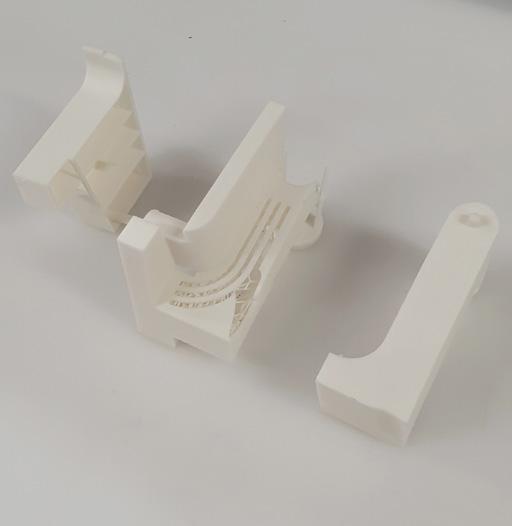







| Manifesto / Assembly Manual
* Intentionally copying an IKEA assembly manual - To view the document, Click Here.




Vertical Warehouses
1st place in Upcycling Retail international competiton hosted on uni.xyz
Jury: Nader Tehrani, Ángel Verdasco
Architects: Nima Shoaie, Yasaman Arjomand
Renderings: Kaveh Dadgar
Date: September 2019
Quoting competition Brief:
" Retail Collectives, Malls or Mega Markets were largely the heart of public activity in their peak times. They were successful in delivering an “All under one roof” experience for a certain timespan. However, it is visible that the model is slowly turning obsolete today. This may be attributed to their rigid design strategy with no room for flexibility or lack of comprehension towards changing trends of retail. These limitations and lacking variety eventually repelled people to other convenient forms of shopping like e-commerce. The battle of online vs offline gives the perception that these forces are fighting for customers, whereas both are trying to deliver a better kind of experience to people. With a common goal in sight, can these two forces play together instead of playing against each other? "
This project aims to create a new typology of retail by combining the physical manifestation of online shopping in the real world (i.e: Amazon Fulfillment Center) and the already established diagram of a linear marketplace, which will in turn increase the synergy of both online and offline retail in this project.


Path and Target
Successful marketplace in all times are always formed in roads leading to a “bustling” place, as these paths always have a steady flow of people This flux of crowd will provide the shops with visitors, turned customers, which might lead to better sales compared to other stores in low-visited areas.

A supreme example of this rule is Parvaneh Parking Lot/Market, located in Tehran, Iran. In this case, “Target” is defined by a simple change of program within the building: On fridays, the parking lot is trasformed to an urban marketplace. This time limitation in itself results in the creation of an Event, Which attracts a steady flow of people to the building. The architectre of this building is also supportive of this programatic change, as the ramps used to lead the cars to upper levels now act as sloped surfaces, leading people on a linear path to the end of the marketplace with ease.
2. Warehouses


Online Shopping is manifested in our physical world through warehouses. They, in their current form, act as the middleman between the Buyer and the Seller; which they have the duty of preservation, packaging and distribution of cargoes. These warehouses are constantly evolving based on the trends and needs of its time (i.e: Amazon Fulfilment Centers using robots to better organize their inventories)
3. Offline and Online synergy

Considering the inability of online shopping platforms to convey “atmosphere” to the customers, (atmosphere, in this instance, means sensory abilities being affected by the local enviroment) offline retail units will remain as an irreplacable platform of shopping, since “atmosphere” acts as even some kind of advertisement for attracting more customers and increases “Brand Loyalty” (The tendency for a customer to keep shopping from the same brand). In the provided proposal, offline retail enables social interaction and better understanding of shop items via physical display.
Target = Event
Target
4. A New Typoloy
To create a new typology of retail, the above-mentioned diagrams (charasteristics of Offline and Online retail units) are combined together.

5. Design Strategy
Considering the constant availableness of online shopping items at the warehouse and the ability to ship directly to destination, 2 proposals are presented on how to use the stores:
1. People can rent stores as places to sell and present their items, while at the same time having the benefit of using the warehouse’s ability to preserve and distribute items.
2. Warehouse can employ people as vendors for presenting the available goods at the warehouse in order to advertise its items and increase its’ sells, while at the same time contribiuting to the increase of the employment rate.

Connection of Vertical Warehouses to one side of each individual store, brings about the transportation of goods to each and every store. The flowing flux of crowd attracted by the pressence of the Event and moving in designed linear path leading to the event, is providing the needed customers and viewers for the stores. In addition, Event can be supplied from the warehouse using a direct access.

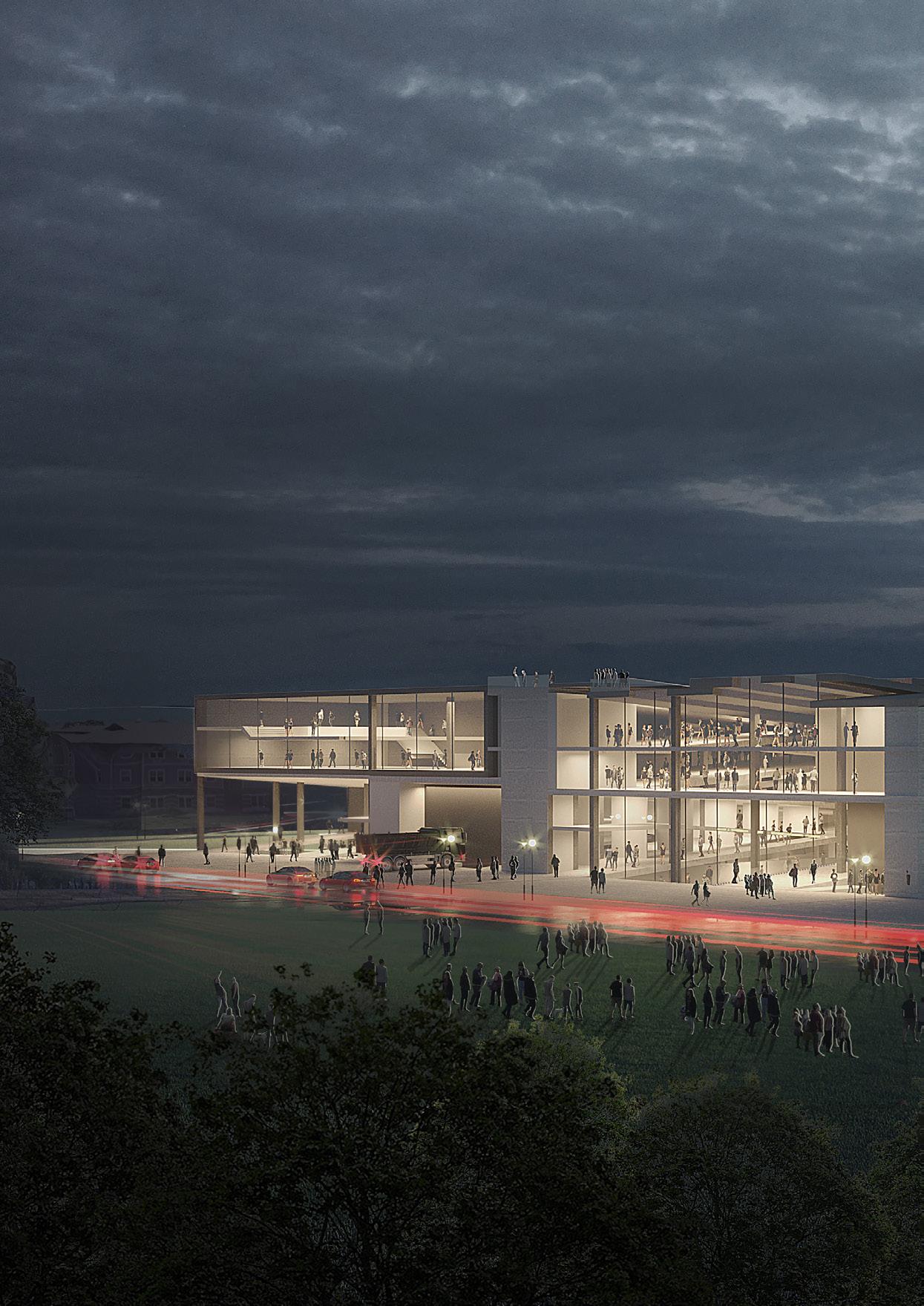

Vertical Warehouses
This project is consisted of intersection of traversable sloped surfaces with each other, which are the main organizing elements of warehouses and stores. This intersects help creating space and contribute to the


Basic flat surface
Creation of 8% sloped surfaces

Allowing easy traverse on the surface; while creating a sheltered space beneath Allows the change of direction
Intersection of two surfaces
Space Organization
Creation of Cells in between two intersected surfaces, while at the same time controlling the circulation

Using the sloped surfaces, each “Picker” can run the lenght of the warehouse from bottom to top on foot with ease


Interaction with
Picker will pick up the item ordered by the customer and reaches the shop [Using sloped surfaces] to deliver the item to the vendor Storing Items
Event in progress
500 x Shop units (25 m2)

Each shop is connected to one of the warehouses
Vertical Warehouses
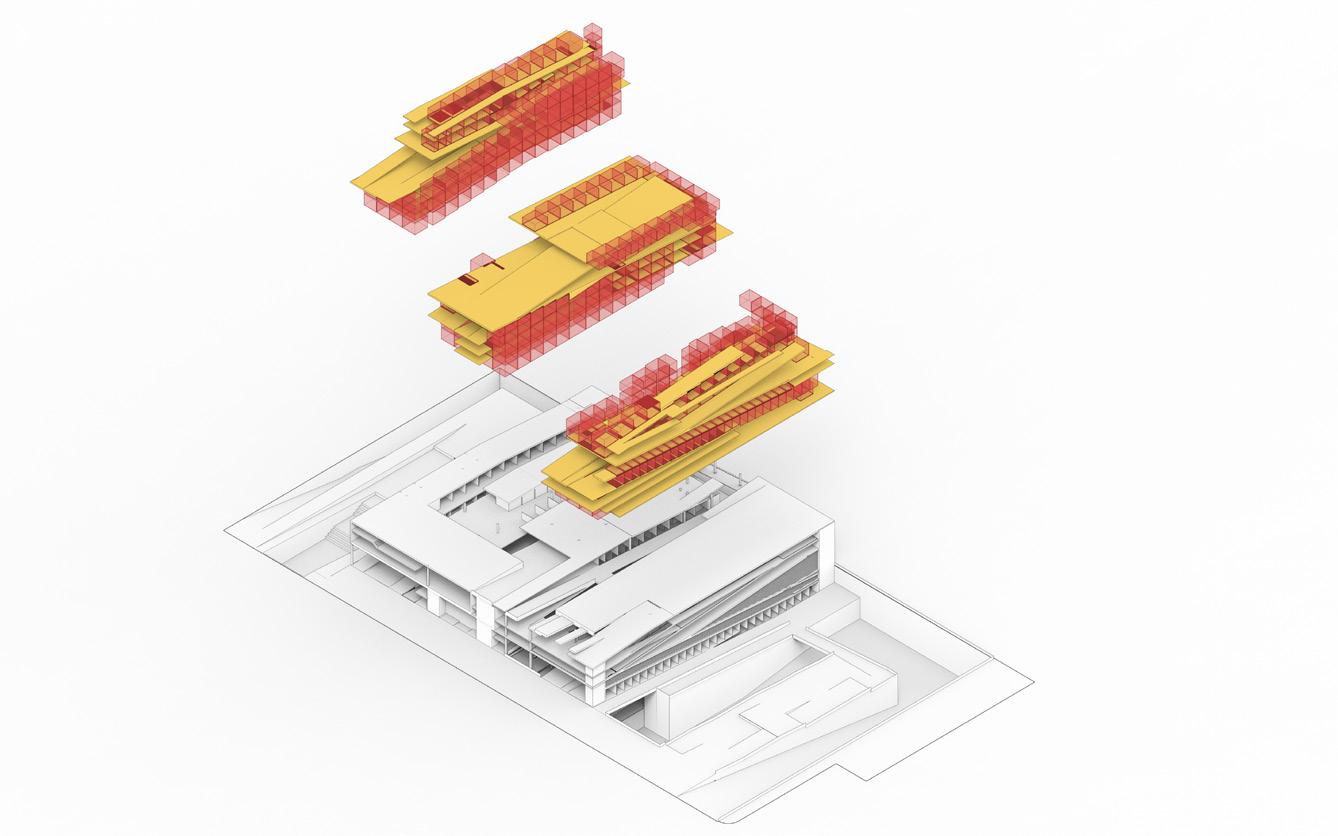
Each shop is connected to one of the warehouses

The paths leading to the event are designed to provide various alternative circulations in order to put most of the stores in direct contact with the flux of the crowd. Event, as a primary destination for the visitors, due to its’ open space and flexibility, is able to contain within itself a whole range of performances. Our propsal is limiting each activity to a certain day in the week, as to ensure the arrival of different people and attract more visitors.

Main Circulation







Hub

Outer Circulation
Public Space
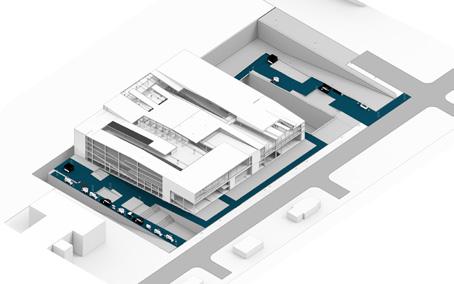





Misreading Geometry

Workshop, CAAI School Of Architecture
Student: Nima Shoaie
Tutor: Pooyan Ruhi
TAs: Mohammad Alavi, Sadra Sharifi, Negar Dolati
Date: December, 2019
The works produced here are the result of an intense design-research workshop. Any design-research endeavor focuses on specific design problems-in this case architectural problems-and tries to investigate those problems. Not so much for reaching a solution, but more as to investigate the possibilities for that specific problem. In doing so two different yet related territories were explored; the conceptual and the technical. The projects which are presented here are the result of a dialogue with some disciplinary issues such as sectional object and figure/ground relationship (conceptual realm).
The works presented here are proposals for the past, the now, and the future. An architecture that might have been, could be, and might be. An architecture which is the result of experimentation, speculation, and critical thinking. We are suggesting that the world could be other than it is.
As Pooyan himself said: "We believe in ideas. We believe that if something is not experimental, it is not worth doing. We believe that architecture is not an ideology. It is not just about feelings. it is not a populist idea, and more importantly it cannot save the world. We believe in architecture for the sake of architecture, architecture as a form of knowledge, as a cultural product."

Mass Studies


The point of departure for this exercise was Persian carpets: They were used as inventories of abstract geometries which were extracted and turned into 3D massess using different techniques such as stacking, scaling and rotation. The masses were then sliced in a sequential manner in order to produce geometrics which are detached from their original and raw status. Next step is working on the interiority and the tectonic of the envelope and destabalizing the conventional generic reading of these elements.











PROFESSIONAL WORKS
Astan Ghods Museum Competition

WAF 2021 Winner, "House - Future Projects" category
Elahie Residential Apartments

Astan Ghods Museum Competition

MARZ Design office
Invited Competition Entry, Third Place
Architects: Mahyar Rakei, Nima Shoaie, Saleh Hariri, Farshd Nasiri, Mehrnaz Zarrin, Amir badi’i
Principal Architect: Hooman Talebi
Renderings: Kaveh Dadgar, Farshad Nasiri
Documentation: Nima Shoaie, Saleh Hariri, Mahyar Rakei, Mehrnaz Zarrin
Date: July - October 2018
Imam Reza’s shrine in Mashhad, Iran, is considered one of the most visted holy sites in the whole muslim world. With a large number of pilgrims, comes a large wave of offerings and tributes to the holy shrine, which would be placed within the existing museum in the complex. The exisitng “museum” acts more as a storage rather than a museum, with a low visiting rate from the pilgrims. Thus a competition to erect a new museum, alongside the outer border of the complex in a much bigger land was commenced, with the goals of bringing in more population flow into the complex and the museum.
The propsed museum follows the “structure” as the rest of the complex: courtyards (“Sahns”) make up the majority of the shrine, in which different programs take place (religious activites, education and etc. ). Thus a roofed courtyard was designed at the ground level to both act as an event space and to connect the museum directly to the shrine. Therefore museum spaces are situated in the underground levels and one level above ground.
Five enormous pillars were erected to act as space organizers and support the above ground level, in which gallery spaces are situated in and between this pillars, resulting in two circulation paths being formed around the pillars.



Current programatic schedule of Imam Reza Shrine, alongside the propossed museum (Blue); courtyards ( “Sahn” ) make up the programatic structure of the shrine








Southern Elevation
Eastern Elevation





Ground Floor







First underground Floor
Second underground Floor
Forth underground Floor
Fifth underground Floor
First Floor




Shahgholi Villa
FMZD | Farshad Mehdizadeh Design
WAF 2021 Winner, House - Future projects category
Project Architect: Nima Shoaie
Principal Architect: Farshad Mehdizadeh
Renderings: Ali Kazemi, Niloofar Zohrehvand

Documentation: Nima Shoaie
Date: June - September 2019
Status: Under Construction
Shahgholi villa is located on the outskirts of Tehran, Iran, near the town of Demavand. The client commissioned a villa within a garden, wishing to expericence a different lifestyle than that of what is experienced in the routine city lifestyle. The design was started with the question that how can a new lifestyle be created different from the daily routine of the city?
To create this new lifestyle, it must be connected to the context the villa is located in: That is the ground, geographical features, architectural elements, etc. By analyzing the region of the site, it can be seen that there exist numerous "Garden Fields" that are defined by borders which are enforced by walls. The close proximity of this walls near each other produce the “garden alleys” phenomenon, which are narrow alleyways with the greenery of the surrounding gardens pouring over the walls.
Therefore, in this context the walls have a critical role in organizing the privacy, borders, circulation and accesses. Yet these walls aren’t used as an architectural element to organize or generate the building inside: The building inside that garden is just an island within the border that has minimum role to organize the whole garden. In order to create the new lifestyle, the project should follow the context; therefore, it needs to be organized by the context DNA and its elements. Refrencing this, The walls stand out as a potential architectural element because they’re part of that Garden Fields structure. This project seeks to organize both the ground and the villa simultaneously by using the garden’s field and its elements and behaviors, the aforementioned “border walls”.
To achieve this, the walls that act as the border of the ground increase in thickness in certain areas of the ground, which will be the mass of the villa that house the functions inside. Walls and volumes reach out from the original surrounding wall, each side communicating with the other side internally, all while likening itself to a small village. The base ground was lowered one level, so that the thickening of the wall creates both the villa and the landscape itself, while attaining privacy. Further referenceing the architectural language of the project and creating unique spatial conditions, the roof is curved similar to the shape of the surrounding wall. This results in attributing characteristic unique to spaces all around the villa and the ground: Each corner of the villa and the ground has spatial qualities unique to itself that differentiates it from the other points. This contributes to house a new kind of lifestyle in the villa that the brief required.

Typical Villas
MAINACCESS
Proposed Design

L
Design Strategy
By changing the thickness of garden walls at certain points, they act as architectural organiztaion elements, contributing to organizing both the ground and the building
Typical Villas Design Proposal Both organized by walls seperate organization



































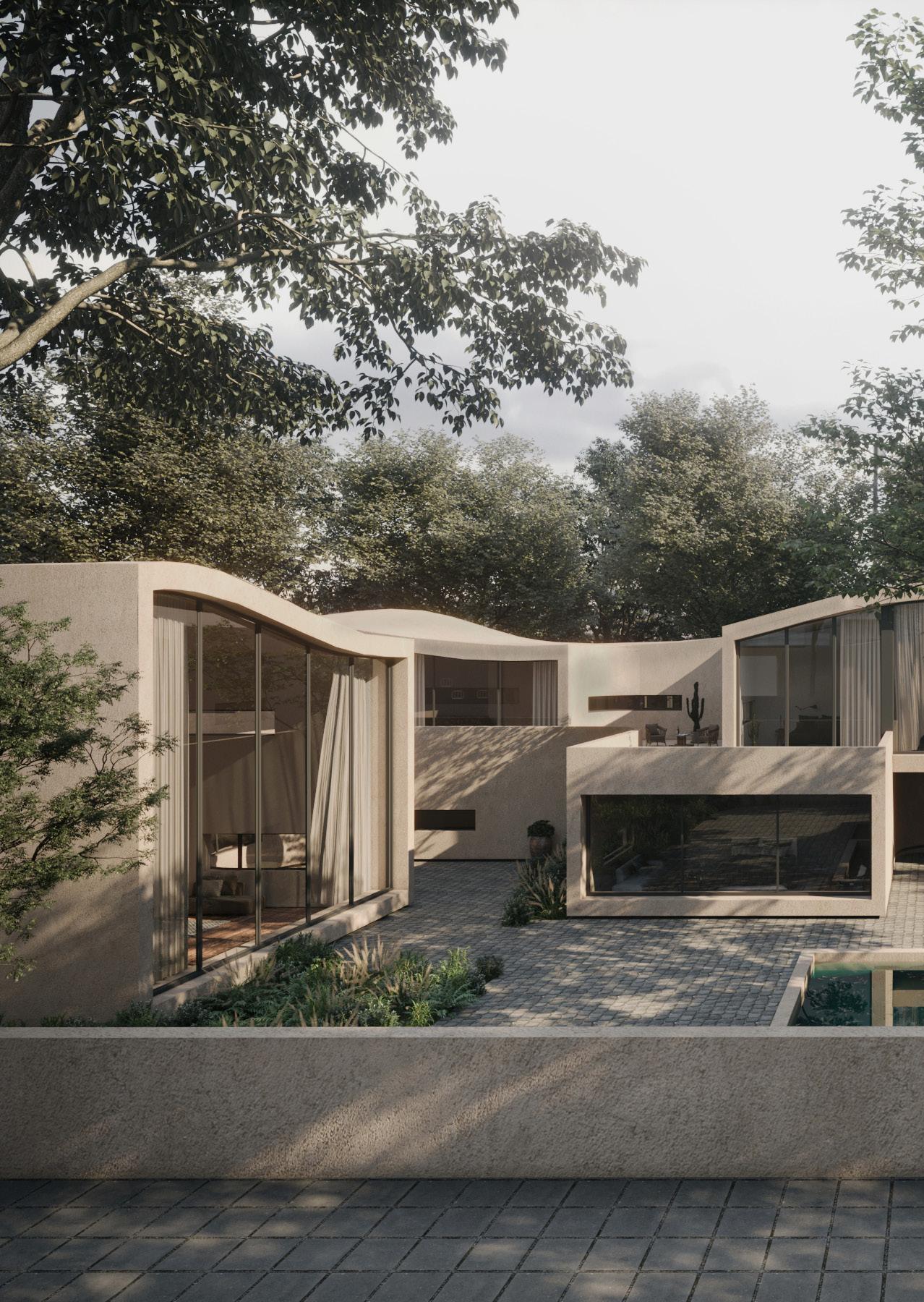

Elahie Residential Apartment
FMZD | Farshad Mehdizadeh Design
Project Architects: Nima Shoaie, Anahita Jeyhani

Principal Architect: Farshad Mehdizadeh
Renderings: Ali Kazemi, Niloofar Zohrehvand
Documentation: Nima Shoaie
Date: October 2019 - January 2020
Status: Under Construction
Elahie Residential Apartmet is located in the northern part of Tehran, Iran. Common building developement in Tehran enforces a strict code of density regulations, thus most apartments don't possess a sizeable open space such as terraces. This project was designed to be faithful to the density regulations enforced by the municipatory while at the same time providing unique spatial qualities for the dwellers within by bringing lifting the greenary from the ground level and extending it to the roof.
The intial question of the project was to how to disintergrate the generic cartesian grid, used in most apartment buildings in Iran as the base layout, to its basic elements, and use them to organize the space and create spatial qualities unique to each floor. Basically, the grid undergoes a "metamorphosis' from one side to the other. Disintegrated members, in the form of vertical members, act as flower boxes that form a green wave starting from the ground level that ends in the roof.



Design Strategy
Disintegration of generic grid facade into vertical members, which creates a platform for greenary to climb the building to the roof.
 by Farshad Mehdizadeh, Principal Architect
Sketch
by Farshad Mehdizadeh, Principal Architect
Sketch

Generic Cartesian Grid

Distruption of the grid using a linear gradient



Distruption of the Slabs and the walls
Growth of the flower boxes, acting as space organizers and an architecture element
METAMORPHOSIS
The Green Axis has distrupts the common buidling facade, creating unique spatial qualities and connecting the ground to the roof with greenary


M E T A M O R P H O S I S










Personal Works
Personal Works
Personal Works in other Disciplines

This section featues select studies and personal artworks created in the fields of Academic Drawing, sculpting [some under the tutorship of Raffi Davtian], Illustration, Digital Arts and other artistic endeavours from 2014 to 2022.
To view the complete Arts portfolio, Click Here.





Untitled 60cm x 40cm, Black, White and Pink conte pencil on cardboard. 2019

"Alexander Doesn't Want To Get Up In The Morning And Neither Do You" (Part of the ongoing "Neither DO [/SHOULD] you" series) 30cm x 40cm, Black, White and Red conte pencil on cardboard. 2022

"Alexander Seeks Solace In The Face Of The Coming Death-Journey And So Should You" (Part of the ongoing "Neither DO [/SHOULD] you" series) 30cm x 40cm, Black, White and Red conte pencil on cardboard. 2022








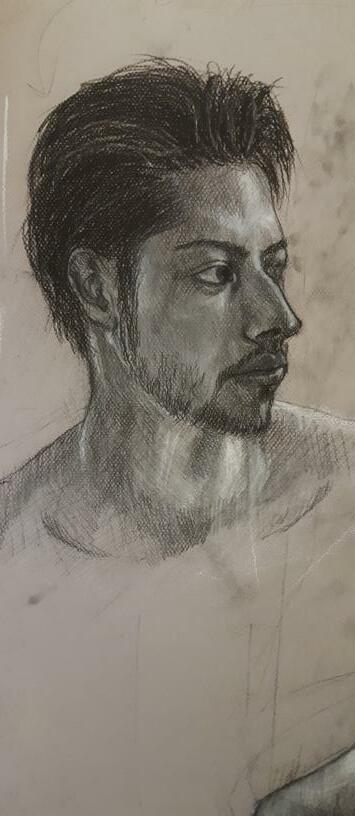

"Digital Apotropaic Unit" Designed and Rendered in Blender 2021

SCAN ME !
When Miriam, Saint of the Deep, is in the process of Reassembly, She dreams of the ages gone, of the time when she still spoke her now-dead ancient tongue, before the parts were installed. So to remind herself of her past life and keep her culture alive, she adorns her vessel with the sayings of the old, which praises the sacrifices of her mother and laments lost love pursuits. "
"




"Digital Apotropaic Unit"
Designed and Rendered in Blender 2021



"Sentient Turret/Cooperation Assurance"
 Designed and Rendered in Blender Inspired by the work of Curtis Holt 2020
Designed and Rendered in Blender Inspired by the work of Curtis Holt 2020



Facemask"


Scale [DOES] matter ! / 1.Leliel Architectural reading of "Scale" as explored in Neon Evangelion Genesis January, 2018


Scale [DOES] matter ! / 2. Sniper Rei Architectural reading of "Scale" as explored in Neon Evangelion Genesis January, 2018


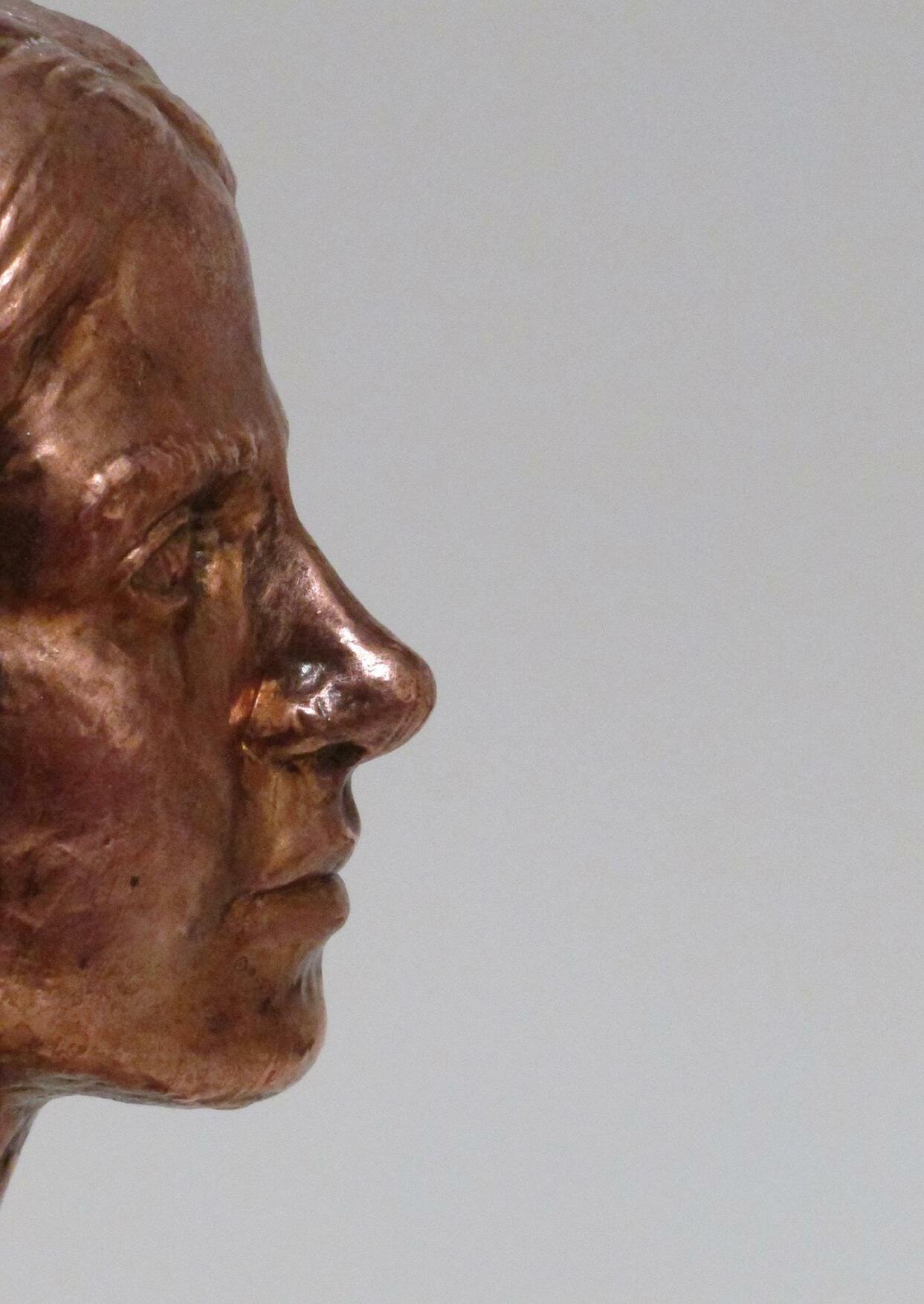


Portrait study, clay 2018



Contact Info
Email: nimaps376@yahoo.com Instagram: nimashoaie Telegram: NiMaHiG76
LinkedIn: Nima Shoaie twitch.tv/nimahig artstation.com/nimahig76 issuu.com/nimashoaie

